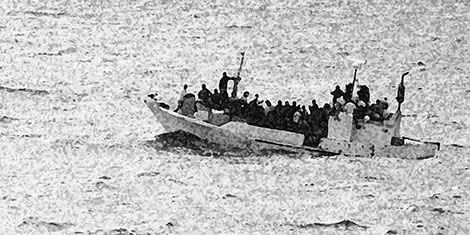
This article was originally published by the IPI Global Observatory on 20 October 2017.
In recent weeks, allegations have surfaced that Italy has been paying armed groups in Libya to cease smuggling migrants into the country. Some estimate that the number of migrants crossing the Mediterranean into Italy has reduced by half compared to the same time period last year. At the heart of the issue is a governance vacuum that allows armed groups to control the flow of migrants in and out of Libya, presenting a unique challenge for governments in North and West Africa and EU policymakers.
In 2015, most migrants to Europe traveled through the Eastern Mediterranean route from Turkey to Greece. Some 150,000 arrived in Italy by sea through the Central Mediterranean route that same year. Within one year, that number had increased to approximately 180,000, with ninety percent having departed from Libya. The increased prominence of the Central Mediterranean route is partly a result of the 2016 EU-Turkey agreement to end irregular migration through the Eastern Mediterranean route, which made the latter route less significant. However, the increases in arrivals in Italy are not due to a redirection of migration flows from Syria, Iraq, and Afghanistan. Those making the journey are overwhelmingly from West Africa, with Nigerians and Guineans being the most heavily represented nationalities.
The vast majority of West African migrants leave their countries as a result of socio-economic push factors. They tend to enter Libya from Niger with help from armed groups who dominate the smuggling industry along the southern border area. Once they enter Libya, migrants are transferred to smuggling hubs, such as those in Sabha and Bani Walid, where they often try to find work in the informal sector until they have enough money to pay for the next leg of the journey to Italy. For many groups, especially Nigerians, Italy is the desired destination due to the presence of West African communities.
The situation in Libya itself acts as an additional push factor. In the past, migrants might have found work in the country and stayed. Today, the lack of governance and security is causing them to transit as quickly as they can. Work is scarce, and should they be unlucky enough to be detained in one of the few functioning detention centers, they could suffer abuse, including beatings and torture. In the best case scenario, detention only comes with lack of access to healthcare, food, and water.
While European policymakers may have preferred to strike a deal with the UN-backed Government of National Accord (GNA) similar to the agreement with Turkey, the GNA lacks the capacities of the Turkish government. Moreover, the GNA does not have full territorial control, particularly in the south of the country where people smuggling is rife.
The EU has been attempting to disrupt migrant smuggling off the coast of Libya through its European Naval Force Mediterranean (EUNAVFOR MED) Operation Sophia, which was launched in 2015. The EU operation has, however, been hindered by not having permission to operate in Libyan waters. As a compromise, Operation Sophia’s mandate was expanded in 2016 to include the training of the Libyan navy and coast guard. In addition, the EU has been working with authorities in Niger to combat smuggling networks and reduce migrant entries into Libya.
Yet, despite these measures, large numbers of migrants continued to depart from Libya in the first half of 2017, prompting the EU to launch a new Italian-led initiative aimed at engaging local intermediaries, including local councils or mayors, to curb smuggling activities. However, it appears that these local intermediaries have co-opted armed groups previously involved in smuggling to halt the flow of migrants in return for financial incentives.
While the numbers of migrants arriving in Italy by sea did dramatically fall in July and August, seemingly vindicating the EU’s new approach, this has come at a cost to Libya itself. The past few weeks have seen fighting between those armed groups that have been empowered to crack down on smuggling and their rivals. As such, the initiative risks further destabilizing an already unstable country for the sake of what are likely to be only short-term gains.
Indeed, overcoming short-termism could be the biggest challenge when it comes to tackling irregular migration to Europe. Armed groups in Libya can be fickle. Those involved in people smuggling need to be incentivized to disengage from such activities in a sustainable way. This could include providing them an alternative, such as the prospect of integration into future police or army structures. Sustainable revenue sources also need to be created for communities that depend on smuggling activities and this, in turn, may be heavily dependent on improving the overall economic situation in Libya. Ultimately, of course, livelihoods in West Africa need to be generated through long-term development initiatives.
About the Author
Lisa Watanabe is Senior Researcher at the Center for Security Studies at ETH Zurich.
For more information on issues and events that shape our world, please visit the CSS website.

